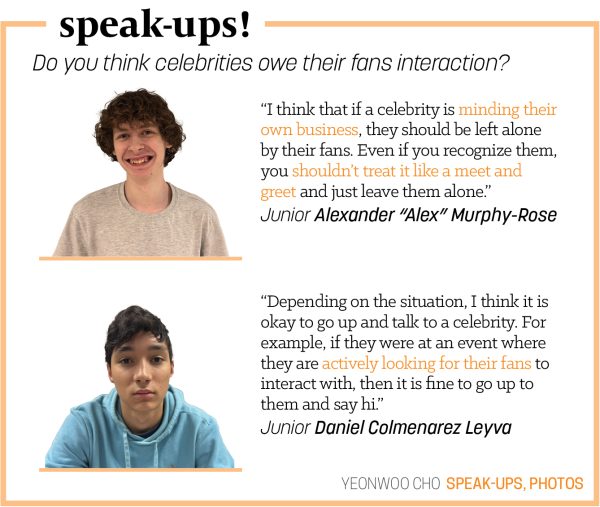Music artist Chappell Roan had her first taste of fame as an opening artist for Olivia Rodrigo’s Guts World Tour in early 2024. Since then, Roan has become extremely popular, with her single “Good Luck, Babe!” reaching Number 4 on the Billboard Hot 100. Considering her 10 years of releasing music, Roan’s fame is well deserved, but it has come with some unfortunate drawbacks for the singer.
In an interview for Rolling Stone, Roan opened up about her experience with stalkers and fan harassment. Roan said she had met a particular stalker in her home state, Missouri, and since then, they have shown up at her parents’ home and even Roan’s hotel room in New York. Roan said other fans have berated her in the airport for autographs and one went as far as kissing her at a bar while she was out celebrating a friend’s birthday.
This is an example of a parasocial relationship, defined by the Oxford Dictionary as “the one-sided, unreciprocated sense of intimacy felt by a viewer, fan or follower for a well-known or prominent figure (typically a media celebrity), in which the follower or fan comes to feel (falsely) that they know the celebrity as a friend.”
Parasocial relationships are nothing new, but in recent years, fan behavior has become more intrusive, especially with the use of social media. On Instagram and TikTok, fan pages have become the norm, with users posting images and videos of their favorite artists every opportunity they get.
Music artist Amala Ratna Zandile Dlamini, known as Doja Cat, has also struggled with disturbing fan interactions in the past. In a 2023 interview for Vogue Australia, Dlamini mentioned encouraging fans on social media to delete their fan accounts and “rethink everything.”
“My theory is that if someone has never met me in real life, then, subconsciously, I’m not real to them,” Dlamini said. “So when people become engaged with someone they don’t even know on the internet, they kind of take ownership over that person. They think that person belongs to them in some sense.”

As celebrities like Dlamini and Roan speak up about unwanted fan interactions, it is important to take their side of the situation into consideration. On Aug. 19, Roan posted two TikToks sharing her opinion on her fans’ behavior and calling her supporters to put themselves in her shoes.
“I don’t care that abuse and harassment, stalking, whatever, is a normal thing to do to people who are famous or a little famous… I don’t care that it’s normal,” Roan said. “I don’t care that this crazy type of behavior comes along with the job, the career field I’ve chosen. That does not make it okay.”
In her Rolling Stone interview, Roan mentioned other music artists who have reached out to give her advice on fame and fan interactions. Roan said many artists, including Charli XCX, Billie Eilish, Katy Perry, Miley Cyrus and Lady Gaga shared similar sentiments about the unwanted aspects of being famous.
“I don’t want to be agoraphobic. That’s (how) most of my peers (feel),” Roan said. “Every artist is on this page. Everyone is uncomfortable with fans. Some people just have more patience. I don’t.”
I’m all for being a fan of celebrities, but the behavior of some fans is excessive. Sure, if a celebrity is willing to take photos with or sign autographs for their supporters, that’s fine, but if they do not want to interact with fans, they shouldn’t have to. If you are truly a fan of, and support, a celebrity, you should listen to and understand their feelings on the relationship between themselves and their fans. You probably wouldn’t want a stranger coming up to you on the street and bombarding you for a selfie, and in most cases, celebrities don’t want that either.
The views in this column do not necessarily reflect the views of the HiLite staff. Reach Mady Kiser at mkiser@hilite.org.

































![AI in films like "The Brutalist" is convenient, but shouldn’t take priority [opinion]](https://hilite.org/wp-content/uploads/2025/02/catherine-cover-1200x471.jpg)









































![Review: “The Immortal Soul Salvage Yard:” A criminally underrated poetry collection [MUSE]](https://hilite.org/wp-content/uploads/2025/03/71cju6TvqmL._AC_UF10001000_QL80_.jpg)
![Review: "Dog Man" is Unapologetically Chaotic [MUSE]](https://hilite.org/wp-content/uploads/2025/03/dogman-1200x700.jpg)
![Review: "Ne Zha 2": The WeChat family reunion I didn’t know I needed [MUSE]](https://hilite.org/wp-content/uploads/2025/03/unnamed-4.png)
![Review in Print: Maripaz Villar brings a delightfully unique style to the world of WEBTOON [MUSE]](https://hilite.org/wp-content/uploads/2023/12/maripazcover-1200x960.jpg)
![Review: “The Sword of Kaigen” is a masterpiece [MUSE]](https://hilite.org/wp-content/uploads/2023/11/Screenshot-2023-11-26-201051.png)
![Review: Gateron Oil Kings, great linear switches, okay price [MUSE]](https://hilite.org/wp-content/uploads/2023/11/Screenshot-2023-11-26-200553.png)
![Review: “A Haunting in Venice” is a significant improvement from other Agatha Christie adaptations [MUSE]](https://hilite.org/wp-content/uploads/2023/11/e7ee2938a6d422669771bce6d8088521.jpg)
![Review: A Thanksgiving story from elementary school, still just as interesting [MUSE]](https://hilite.org/wp-content/uploads/2023/11/Screenshot-2023-11-26-195514-987x1200.png)
![Review: "When I Fly Towards You", cute, uplifting youth drama [MUSE]](https://hilite.org/wp-content/uploads/2023/09/When-I-Fly-Towards-You-Chinese-drama.png)
![Postcards from Muse: Hawaii Travel Diary [MUSE]](https://hilite.org/wp-content/uploads/2023/09/My-project-1-1200x1200.jpg)
![Review: "Ladybug & Cat Noir: The Movie," departure from original show [MUSE]](https://hilite.org/wp-content/uploads/2023/09/Ladybug__Cat_Noir_-_The_Movie_poster.jpg)
![Review in Print: "Hidden Love" is the cute, uplifting drama everyone needs [MUSE]](https://hilite.org/wp-content/uploads/2023/09/hiddenlovecover-e1693597208225-1030x1200.png)
![Review in Print: "Heartstopper" is the heartwarming queer romance we all need [MUSE]](https://hilite.org/wp-content/uploads/2023/08/museheartstoppercover-1200x654.png)




![Parasocial relationships unnecessary, intrude on celebrities’ lives [opinion]](https://hilite.org/wp-content/uploads/2024/09/4-Mady-Kiser-Cover-1200x471.jpg)